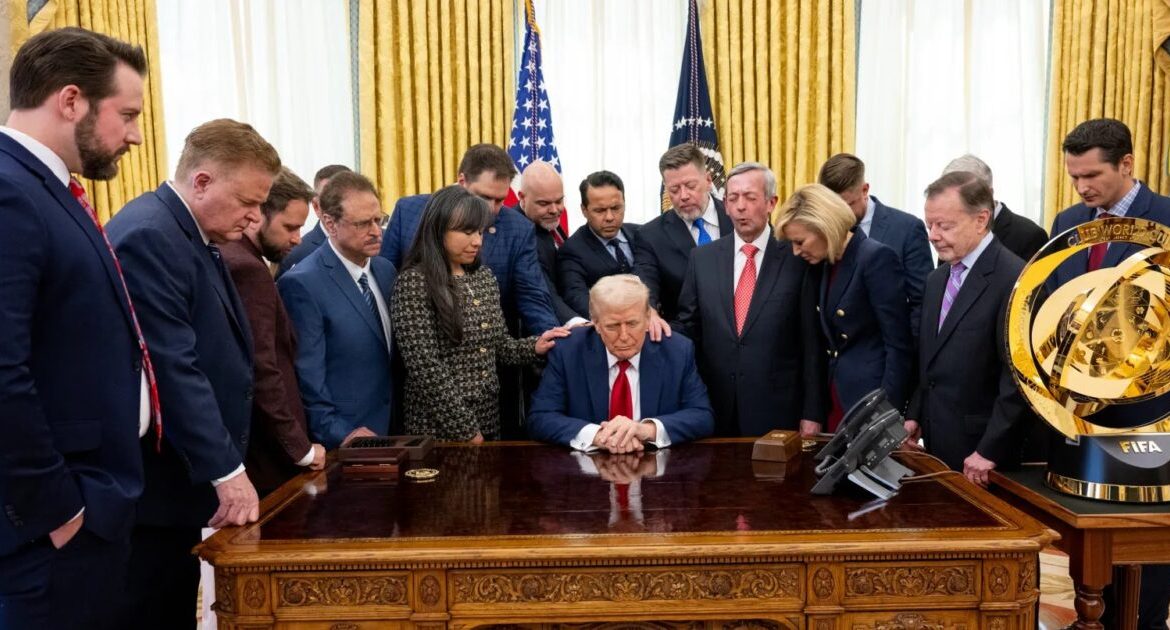
Faith in the Current Administration: The Most Openly Christian Administration in 200 Years


The Trump administration is arguably the most openly Christian and pro-religious administration since the era of the founding fathers. While past presidents such as Jimmy Carter openly spoke of their faith and Ronald Reagan called for prayer in schools, no modern administration has gone as far in defending and advancing religious liberty.
Trump has restored protections for Christians, especially Catholics who faced persecution under the Biden administration. He has also enacted policies that strengthen the Christian values on which the nation was founded. Furthermore, his administration includes an unprecedented number of openly practicing Christians at the highest levels of government, making faith a defining feature of national leadership.
Among the many steps taken to protect Christians, and specifically Catholics who were persecuted under President Biden, Trump has enacted sweeping measures to restore religious liberty. He created the first-ever White House Faith Office in the West Wing, appointed faith liaisons across federal agencies, and established a Religious Liberty Commission.
His administration launched a Task Force to Eradicate Anti-Christian Bias, issued executive orders to secure religious rights, pardoned Christians prosecuted under the prior administration, and rescinded regulations that conflicted with Supreme Court religious liberty precedents.
The Department of Justice defended free speech in houses of worship and backed religious schools, while the Department of Veterans Affairs ended restrictions on chaplains’ sermons. Trump also rolled back the weaponization of government against people of faith by ending politically motivated debanking, curbing FACE Act prosecutions against pro-life activists, and issuing orders against censorship. His administration celebrated religious holidays at the White House, from Easter and Pentecost to Passover, Ramadan, and the National Day of Prayer, reflecting a commitment to protect and uplift faith communities.
President Biden celebrated Transgender Awareness Day at the White House on Easter Sunday.
Beyond protecting Christians, Trump has advanced policies that reinforce the Christian values on which the nation was founded. He created the first national school choice program, safeguarded religious education, and ordered DEI ideology stripped from classrooms. He strengthened parental rights, reinstated school discipline policies, and banned taxpayer funding of abortion while expanding adoption tax credits.
His administration reaffirmed biological truth by affirming only two sexes, shielding children from experimental procedures, and restoring military standards based on merit. For the armed forces, Trump reinstated service members discharged for refusing vaccine mandates and ended Biden-era gender ideology programs, ensuring readiness and unity. He underscored America’s heritage by ordering the “One Flag Policy” at embassies, reshaping the Smithsonian to reflect truth in U.S. history, and affirming the nation’s foundation as one under God.
The Trump administration stands out for the number of openly Christian leaders at the highest levels of government, a feature unmatched in recent history. At the top is President Trump himself, who identifies as a non-denominational Christian and often frames his leadership in terms of faith. Critics sometimes question the depth of his personal belief, but even they acknowledge that his policies and the team he has assembled place religion at the center of national leadership.
Vice President J.D. Vance, a Catholic convert, often cites St. Augustine as shaping his understanding of Christianity. He described how difficult it is to be a Christian while running for office, explaining, “When you’re trying to do things that make you liked by as many people as possible, you’re not likely to do things that are consistent with the teachings of the Catholic Church.” He followed this with an affirmation: “I’m a Christian, and a conservative, and a Republican, so I have definite views about what that means.”
Speaker of the House Mike Johnson is an outspoken Southern Baptist who calls himself a Bible-believing Christian. He insists that his worldview flows directly from Scripture, stating, “go pick up a Bible off your shelf and read it. That’s my worldview.” He co-hosts a Christian podcast with his wife, and frames his political career as divinely ordained.
Secretary of State Marco Rubio also speaks openly about his faith. Baptized Catholic but influenced by both Mormonism and evangelical Christianity, Rubio has repeatedly affirmed Christ as the central purpose of his life. He has argued that faith must inform politics and once declared, “God is real! You can’t pass a court ruling that is going to keep God out of the building.”
At the Pentagon, Secretary of Defense Pete Hegseth hosts monthly prayer services, leads Christian prayers for the military, and has spoken of faith as central to leadership. A religious transformation in 2018 deepened his commitment, and he has written about the need for modern Christians to fight with the same conviction as the crusaders of the past.
Other senior leaders share equally deep commitments. Secretary of Health and Human Services Robert F. Kennedy Jr., raised in a devout Catholic household, credits faith with helping him overcome addiction and continues daily traditions such as reciting the Prayer of St. Francis with his children.
The Charlie Kirk assassination was a sad and heinous event. However, the positive outcome is that more and more people, celebrities, social media influencers, and everyday citizens, are becoming more vocal about their Christian faith. Charlie Kirk’s death was the catalyst, but it was the positive Christian climate created by the Trump administration that made this revival possible.
The post Faith in the Current Administration: The Most Openly Christian Administration in 200 Years appeared first on The Gateway Pundit.
